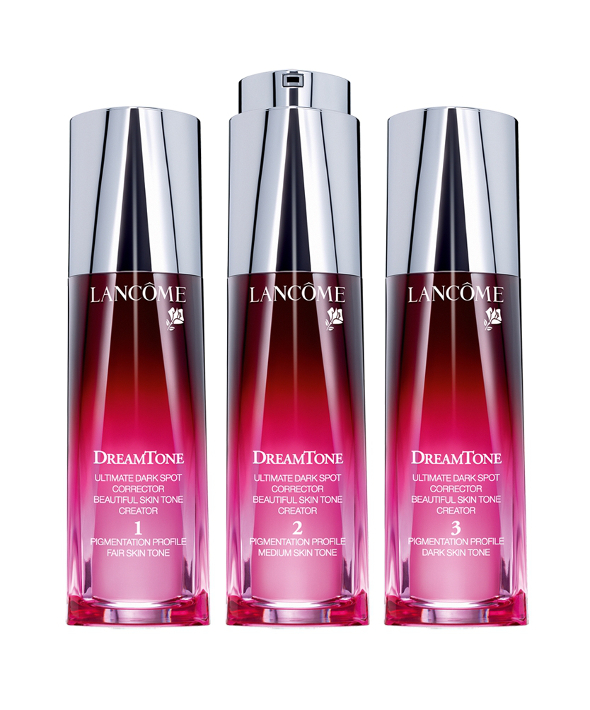It’s all the fault of fibroblasts. That’s the result of the Lancôme’s extensive research as to what causes skin pigmentation like age spots. For years it’s been a long held beauty belief that these were caused by the skin’s pigment cells. But now, Lancôme’s work has proved otherwise.
Image via Lancome
And there is a new product to help. Heralded as the biggest skincare launch by the brand ever, last month Lancôme unveiled its new product DreamTone into selected counters including Glasgow’s House of Fraser. This month, it’s being rolled out across the country. And really, this product has blown apart all previous ideas held about pigmentation, thanks to the DreamTone research.
There is a fair bit of science behind this product so stay with me, it’s worth understanding. During its extensive studies, the brand and its skincare boffins found that there was a worldwide kaleidoscope of skin shades amounting to 64, much more than was previously thought. Blasting another long-held skin belief, Dr Françoise Bernerd and her team found age spots and pigmentation are not caused by the skin’s pigment cells, melanocytes.
In a bid to find out what did in fact cause them, the team spent three years building a reconstructed skin model that could be subjected to tanning. This model then allowed the experts to view the impact of different alternations at different levels of the skin. And it was during these experiments that the team uncovered the dirty little secret of fibroblasts and how they impact on pigmentation.
The new DreamTone product comes in three different skin profiles: DreamTone 1, 2, and 3. All contain a derivative of hydroquinone, which is used to treat severe pigmentation. But each profile also contains a specific ingredient to tackle that type pigmentation seen on that skin. Fair skin can show this with redness, medium skin tones can look more sallow and in darker skin this can appear as purplish blemish marks.
Because as we age, so does our skin change, becoming more uneven across the face. Chances are you may have thought it was freckles or patchy changes in colour to your skin. But pigmentation happens particularly when it’s exposed to sunshine. In your skincare regime, DreamTone goes onto clean face, before moisturiser if needed and can be worn day and night. It’s really light and quickly absorbs in.
Experts say wrinkles are no longer the primary skincare concern of consumers; pigmentation now wears that crown so with such a high scientific pedigree and formula, it seems logical that DreamTone is going to go down in beauty legend.
Lancome DreamTone is out now £69.
